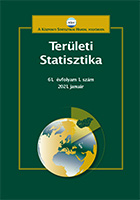Megélhetési tanulók a Borsod-Abaúj-Zemplén megyei felnőttképzésben
Livelihood students in adult education in Borsod-Abaúj-Zemplén County
Author(s): Dávid Hajdú, Gábor KonczSubject(s): Social Sciences, Economy, Geography, Regional studies
Published by: Központi Statisztikai Hivatal
Keywords: livelihood student, human resources; adult education; unemployment; disadvantage; livelihood strategies
Summary/Abstract: In the context of lifelong learning, workers have the opportunity to adapt to the constantly evolving demands of the labour market. However, supported labour market training plays an important role in integrating the disadvantaged population. In the recent period, we have also seen increasing participation of marginalized social groups. With state support, training institutions sought to facilitate the entry and retention of jobseekers in the labour market by organizing trainings in order to develop variouscompetencies. The employment rate of trainees has been characterized by negative trends over the last decade. Due to the decline of public employment, the proportion of jobseekers or those in unknown status after training has increased. Our questionnaire survey was conducted among participants in trainings specifically jobseekers, where we managed to point out the contradictions between the main objectives of the trainings and the motivations of the students. Based on the information obtained from our primary research, we would like to delineate a new, as yet unused definition, the concept of “livelihood student”. In the course of our research, we have come to the conclusion that a livelihood student is a person who does not participate in training for job seekers in order to obtain new information, knowledge, skills and a new job. Instead, they focus on getting the financial support, which means a secure income forthem during the training.
Journal: Területi Statisztika
- Issue Year: 61/2021
- Issue No: 02
- Page Range: 229-254
- Page Count: 26
- Language: Hungarian

